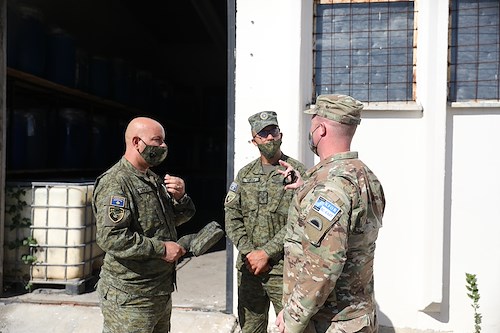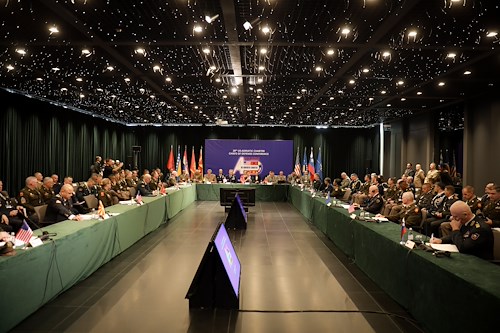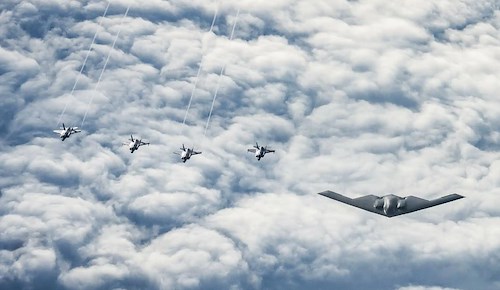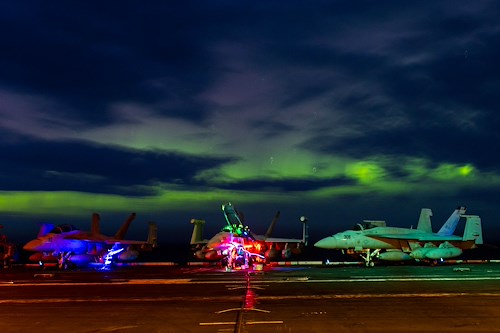Gallery contains 6 images
×
Photo 1 of 6
100th Mobile Public Affairs Deta
1st. Lt. Robert Boyer, talks with members of the Kosovo Security Forces CBRNE (Chemical, Biological, Radiological, Nuclear, and Explosives) Oct. 15, 2020 at a chemical storage unit in Peje/Pec, Kosovo. When placed in the safety officer role for the Kosovo Force Regional Command-East deployment, Boyer, an Army chemical officer organic to the 41st Infantry Brigade Combat Team, Oregon Army National Guard, never imagined that he would be tasked with a special project to visit abandoned and functioning factories around Kosovo and provide recommendations regarding chemical safety.
Photo by: Capt. Nadine Wiley De Moura
Photo 2 of 6
100th Mobile Public Affairs Deta
Members of the Ministry for Environment talk with members of the Kosovo Security Forces CBRNE (Chemical, Biological, Radiological, Nuclear, and Explosives), the NATO advisory liaison team Oct. 1, 2020 at a chemical storage unit in Obilic/Obiliq, Kosovo to discuss environmental and chemical safety.
Photo by: Capt. Nadine Wiley De Moura
Photo 3 of 6
100th Mobile Public Affairs Deta
A team of Italian Army Hazmat Soldiers approaches a building storing chemical waste, Kosovo Security Forces CBRNE (Chemical, Biological, Radiological, Nuclear, and Explosives) company suits up in white chemical protective gear as 1st Lt. Robert Boyer follows behind them and looks around the outside perimeter making notes of any hazards Oct. 1, 2020 at one of Kosovo’s largest energy plants in Obilic/Obiliq, Kosovo.
Photo by: Capt. Nadine Wiley De Moura
Photo 4 of 6
100th Mobile Public Affairs Deta
A team of Italian Army Hazmat Soldiers approaches a building storing chemical waste, Kosovo Security Forces CBRNE (Chemical, Biological, Radiological, Nuclear, and Explosives) company suits up in white chemical protective gear as 1st Lt. Robert Boyer follows behind them and looks around the outside perimeter making notes of any hazards Oct. 1, 2020 at one of Kosovo’s largest energy plants in Obilic/Obiliq, Kosovo. When placed in the safety officer role for the Kosovo Force Regional Command-East deployment, Boyer, an Army chemical officer organic to the 41st Infantry Brigade Combat Team, Oregon Army National Guard, never imagined that he would be tasked with a special project to visit abandoned and functioning factories around Kosovo and provide recommendations regarding chemical safety.
Photo by: Capt. Nadine Wiley De Moura
Photo 5 of 6
100th Mobile Public Affairs Deta
1st Lt. Robert Boyer observes as a team of Italian Army Hazmat Soldiers approaches a building storing chemical waste and Kosovo Security Forces CBRNE (Chemical, Biological, Radiological, Nuclear, and Explosives) company suit up in white chemical protective gear, Oct. 1, 2020 at one of Kosovo’s largest energy plants in Obilic/Obiliq, Kosovo. When placed in the safety officer role for the Kosovo Force Regional Command-East deployment, Boyer, an Army chemical officer organic to the 41st Infantry Brigade Combat Team, Oregon Army National Guard, never imagined that he would be tasked with a special project to visit abandoned and functioning factories around Kosovo and provide recommendations regarding chemical safety.
Photo by: Capt. Nadine Wiley De Moura
Photo 6 of 6
100th Mobile Public Affairs Deta
A team of Italian Army Hazmat Soldiers approaches a building storing chemical waste, Kosovo Security Forces CBRNE (Chemical, Biological, Radiological, Nuclear, and Explosives) company suits up in white chemical protective gear as 1st Lt. Robert Boyer follows behind them and looks around the outside perimeter making notes of any hazards Oct. 1, 2020 at one of Kosovo’s largest energy plants in Obilic/Obiliq, Kosovo. When placed in the safety officer role for the Kosovo Force Regional Command-East deployment, Boyer, an Army chemical officer organic to the 41st Infantry Brigade Combat Team, Oregon Army National Guard, never imagined that he would be tasked with a special project to visit abandoned and functioning factories around Kosovo and provide recommendations regarding chemical safety.
Photo by: Capt. Nadine Wiley De Moura
CAMP BONDSTEEL, Kosovo – A team of Italian Army Hazmat soldiers approaches a building storing chemical waste and Kosovo Security Forces CBRNE (Chemical, Biological, Radiological, Nuclear and Explosives) company dons protective gear as 1st Lt. Robert Boyer follows, making notes of any hazards at one of Kosovo's largest energy plants in Obilic/Obiliq on Oct. 1.
As the safety officer for the Kosovo Force Regional Command-East deployment, Boyer, an Army chemical officer organic to the 41st Infantry Brigade Combat Team, Oregon Army National Guard, never imagined that he would be tasked with a special project to visit abandoned and functioning factories around Kosovo and provide recommendations regarding chemical safety.
“There are things with toxins that are of legitimate use in our society and when they go to waste you need to know what to do with them,” said Boyer, who received his bachelor degree in Urban Planning from Western Oregon State.
“I chose the chemical branch because I enjoy having a technical hand on job and a speciality which closest to being a warrant officer or in an advisory role.”
Boyer has visited nearly a dozen factories and plants, throughout Kosovo and provides recommendations like adding emergency response plans, removing brush around chemical storage facilities for firefighter access and labeling containers.
By visiting these locations as the subject matter expert he increases KFOR RC-E commander’s situational awareness of any environmental safety concerns and what is being done to circumvent hazards as part of KFORs mission to contribute towards maintaining a safe and secure environment in Kosovo and freedom of movement for all in a accordance with the 1999 United Nations Security Council Resolution 1244 mandate.
Boyer works with multiple organizations in visiting sites around Kosovo and higher level organizations such as the Ministry of Environment and the NATO advisory liaison team when he makes his site visits.
“Visits to the facilities and factories are critical because it holds these companies accountable for some of the hazardous material stored in these locations,” said Lt. Col. Joseph Bolcar, NATO advisory liaison team.
“ The Hazmat teams conduct an inspection and submit a report to the ministry of environment, which is like our EPA to help them find other ways to dispose of it, the ministry of environment is the entity that pushes initiatives.”
As a NATO advisory liaison, Bolcar attends the meetings to give command emphasis as a NATO representative to get involved parties to fix the problems.
“Boyer is a subject matter expert really and working with KSF certainly helps them grow as a nation and definitely good to have the collaboration from the Italian Regional Command West Soldiers,” said Bolcar, a Cavalry officer organic to the New Jersey Army National Guard.
“They can work together to figure out the way ahead. Hats off to them doing this thing because it helps them figure out what they need to do and find the right answer to the problem.”
Kosovo Security Forces, the lead for the factory visits, work closely with Boyer, as they both can understand Chemical jargon and technicalities.
Since most of the factories and storage facilities are owned by private companies who don’t have the resources to properly dispose of the chemical waste without harming the environment, the KSF is called in to respond and assist in repackaging and disposing of hazardous waste.
“Many factories are from 1991, the war started, they closed and the factories are in the same situations since then,” said Sgt. Besnik Lokaj, security inspector for the Kosovo Security Forces CBRNE company.
“ It is important because if these chemicals burn, they will have to evacuate the whole city. We are committed to protecting the citizens and the environment.”
While you are here you are also a member of Kosovo, said Lokaj pointing to Kosovo RC-E Soldiers.
Lokaj said that the U.S. and Italy has assisted in providing CBRNE training and equipment in order for them to continue learning and addressing some of the hazardous waste concerns throughout the country.
Lokaj and other Kosovo Security Force colleagues said that they remain vigilant for trends in disposal sites, and maintain close tabs on storage facilities for the safety and security of all people in Kosovo.
Boyer has been inspired by the cross organizational and multinational relationships he has made during the mission and has plans to continue to work in the chemical field.
“Chemical helps chemical so it was easy to build relationships with them, and get my foot in the door to understanding the current situation,” said Boyer.
Boyer, who enlisted in January of 1999, and is a truck driver for his civilian career, said he is still enjoying what he does and plans to get a HAZMAT certification in order to transport chemical goods for his truck driving job profession.
“It’s just a matter of getting credentials, I like to see what is possible, while just trying to have from and break away from the mold.”






















